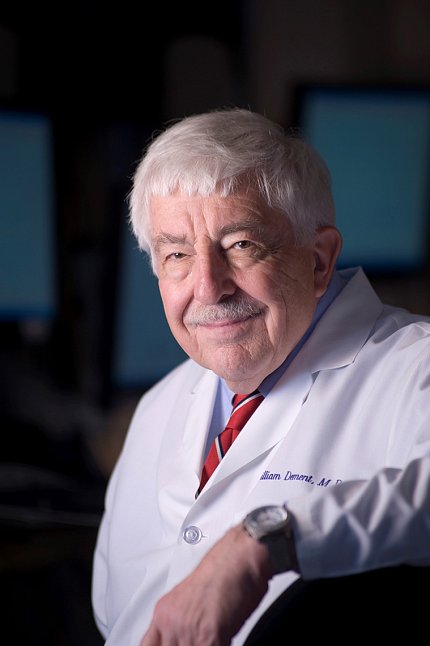Dement, Sleep Medicine Pioneer, Dies at 91

Photo: STEVE FISCH
Dr. William C. Dement, a physician-scientist widely regarded as the father of sleep medicine, died June 17 at age 91. He had a special relationship with NIH that continued for 30 years. He made numerous discoveries about the health and societal impact of sleep problems—including their link to heart disease and even car accidents—and helped establish the National Center on Sleep Disorders Research (NCSDR), part of the National Heart, Lung, and Blood Institute.
“Bill Dement made unparalleled contributions as a scientist investigating sleep and sleep disorders, as a physician and as an advocate promoting the importance of sleep to health, performance and public safety,” said Dr. James Kiley, director of NHLBI’s Division of Lung Diseases and a former NCSDR director.
Over the course of his career, Dement was awarded nearly 40 NIH grants for sleep-related research beginning in 1973 and lasting until his retirement in 2003. Among his accomplishments, Dement was awarded a grant by NHLBI to do the first NIH-funded phase 3 clinical trial for sleep apnea, which looked at continuous positive airway pressure (CPAP) therapy for treating the disorder. That trial found that CPAP reduced sleepiness in people with sleep apnea.
Dement received support not only from NHLBI, but also from other institutes for work related to their mission areas, including the National Institute on Aging, the National Institute of Child Health and Human Development, the National Institute of Mental Health and the National Institute of Neurological Disorders and Stroke. His grants included research on sudden infant death syndrome, narcolepsy, hallucinations, insomnia and sleep problems in nursing homes and the elderly.
Dement, who spent 40 years at Stanford School of Medicine before retiring in 2003, died at a hospital in Stanford, Calif., due to complications from a heart procedure. He was born in Wenatchee, Wash., and later served in the Army during World War II. After his service, in 1951, he earned a bachelor’s degree from the University of Washington. While earning his degree, Dement—a lifelong jazz enthusiast—hosted jam sessions from his houseboat on Lake Union and played jazz bass, sometimes with famous musicians such as Quincy Jones and Stan Getz.
Dement began his sleep research at the University of Chicago in the 1950s at a time when little was known about sleep or its link to health conditions. In 1953, he discovered rapid-eye movement, or REM sleep, and later showed it was the sleep stage in which dreams occur. He received his medical degree at the university in 1955, followed by a Ph.D. in neurophysiology in 1957. Six years later, Dement moved west to join Stanford University’s psychiatry department.
Over the course of his career, Dement would go on to make a number of important discoveries about sleep, including that the sleep cycle had specific phases and that sleep problems could pose hazards such as car crashes and lead to other health issues, too. He linked sleep apnea to cardiovascular problems and speculated that up to 20 percent of the population suffered from the condition, which was later proven to be accurate.
Dement co-authored more than 500 scientific articles and founded the Stanford Sleep Disorders Clinic, the first sleep lab in the United States. He wrote one of the first textbooks on sleep, Primary Practices of Sleep Medicine, and was a founding editor of Sleep, a prominent journal in the field. He also started the American Sleep Disorders Association, the first major professional organization for sleep researchers, which is now known as the American Academy of Sleep Medicine.
In 1971, Dement created one of the first undergraduate courses on sleep, “Sleep and Dreams,” a wildly popular class he continued teaching until about 5 years ago.
Dement helped raise awareness about sleep disorders by appearing on The Tonight Show Starring Johnny Carson and testifying before Congress. His congressional testimony in 1988 helped to create the National Commission on Sleep Disorders Research, which Dement chaired. After Dement’s death, Rep. Anna Eshoo (D-CA) honored him on July 13 with a tribute in the House of Representatives recognizing his contributions to sleep research, noting that he was often seen on Capitol Hill in his role as commission chairman. The commission’s report, which found that 70 million Americans suffered from sleep problems, spurred Congress to create the NCSDR.
Dement is survived by a son, Dr. Nick Dement; 2 daughters, Elizabeth Dement and Catherine Roos; and 6 grandchildren. Dement’s wife of 58 years, Eleanor “Pat” Weber, died in 2014.
